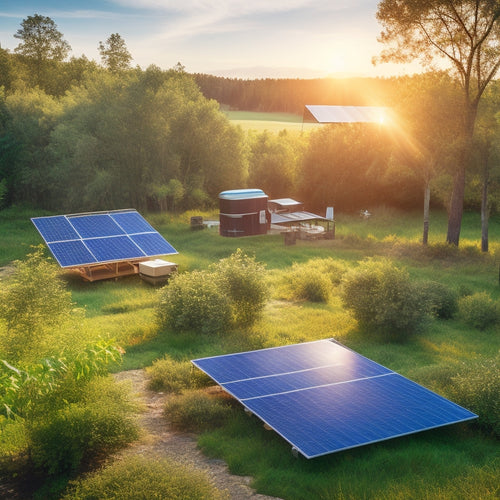
Home Solar System
Share
You're investing in a home solar system to utilize the power of the sun and greatly reduce your reliance on the grid, just as more than 2 million American households have already done. This sustainable choice promotes energy self-sufficiency, reduces your carbon footprint, and can even eliminate utility bills with proper installation and energy-efficient practices. Evaluating your energy needs, maximizing roof space efficiency, and selecting the right solar panels and storage solutions are vital steps in the process. As you delve into the world of home solar systems, you'll uncover how to optimize energy production, conversion, and storage to achieve true energy independence, and there's more to reveal about how to make the most of this renewable energy solution.
The Essentials
- Home solar systems promote energy self-sufficiency and independence by reducing reliance on the grid and storing excess energy for later use.
- Investing in solar energy significantly decreases reliance on fossil fuels, reducing greenhouse gas emissions and contributing to climate action initiatives.
- Detailed cost analysis and customized system design ensure energy savings and potentially zero utility bills for participating households.
- Maximizing roof space efficiency is crucial for optimizing solar system investment returns, considering factors like roof size, orientation, and shading.
- Advanced battery systems and high-efficiency solar panels enable homeowners to maximize energy conversion rates and reduce reliance on traditional energy sources.
Renewable Energy Independence Matters
You're taking an essential step towards energy self-sufficiency by investing in a home solar system, which enables you to generate your own electricity and reduce your reliance on the grid.
By doing so, you'll substantially reduce your carbon footprint, contributing less to climate change and air pollution.
As you progress towards renewable energy independence, you'll enjoy the benefits of lower energy bills and a cleaner environment.
Energy Self Sufficiency Now
As the world grapples with the challenges of climate change and energy security, achieving energy self-sufficiency has become an essential goal for households and communities worldwide.
You're likely considering off-grid living, where your home solar system provides all the energy you need. To achieve this, you'll need to assess your energy requirements and determine the size of your solar panel array.
With the help of advanced battery systems, such as solar panel batteries, you can store excess energy generated during the day for use at night or during periods of low sunlight. Furthermore, a reliable Solar Energy Storage solution solves the problem of intermittency, ensuring a continuous power supply.
Solar incentives, such as government rebates, can help offset installation costs. Battery storage is vital for storing excess energy generated during the day for use at night or during periods of low sunlight.
Energy monitoring systems will help you track your energy production and consumption, ensuring you're maximizing your self-sufficiency. If you're handy, DIY solar installation can be a cost-effective option. Alternatively, financing options are available to help spread the cost over time.
Reduce Carbon Footprint
Achieving energy self-sufficiency through a home solar system also means reducing your carbon footprint, a crucial step towards mitigating climate change. As you shift to clean energy, you'll greatly decrease your reliance on fossil fuels, which are major contributors to greenhouse gas emissions. By doing so, you'll be adopting sustainable practices that minimize your environmental impact.
With the integration of energy-efficient appliances and smart thermostats energy efficiency solutions, your home solar system will become even more effective in reducing your carbon footprint.
Your home solar system won't only reduce your carbon footprint but also offset it through carbon offsetting. This means that for every unit of energy you consume, you'll be producing an equivalent amount of clean energy, effectively neutralizing your emissions. This eco-friendly approach to energy generation will contribute to green building and climate action.
Moreover, a home solar system is an energy-efficient solution that optimizes energy production and consumption. It's an essential step towards achieving energy independence, which is crucial for a sustainable future.
Zero Energy Bills Guaranteed
You can enjoy Energy Savings Guaranteed, as our solar system is designed to produce exactly the amount of energy your home consumes, utilizing photovoltaic cells to capture renewable energy and increase energy efficiency.
By installing residential solar panels, you'll not only reduce your carbon footprint but also benefit from a durable and efficient home solar power system.
This means you'll have Zero Utility Bills, freeing up more of your budget for the things that matter most.
Energy Savings Guaranteed
Your investment in a home solar system is protected with our Energy Savings Guaranteed program, which guarantees zero energy bills for your home. This program guarantees that you'll save a significant amount on your energy costs, giving you the freedom to allocate your resources elsewhere.
Our Energy Savings Guaranteed program is backed by a detailed cost analysis and a careful installation process. Our team of experts will assess your energy usage and design a customized solar system that meets your energy needs.
Here's a breakdown of what you can expect from our Energy Savings Guaranteed program:
| Feature | Description |
|---|---|
| Energy Savings | Guaranteed zero energy bills for your home |
| Cost Analysis | Detailed assessment of your energy usage and costs |
| Installation Process | Careful installation of your customized solar system |
| System Monitoring | Real-time monitoring of your solar system's performance |
| Warranty | Extensive warranty for your solar system |
With our Energy Savings Guaranteed program, you can enjoy the benefits of solar energy while minimizing the risks. We're committed to helping you achieve energy independence and maximizing your savings.
Zero Utility Bills
One of the most significant advantages of investing in a home solar system is the elimination of utility bills. You'll no longer have to worry about rising energy costs or budgeting for your electricity expenses.
With a solar system, you'll be generating your own clean energy and storing excess power for later use through energy storage solutions. This means you'll be completely off the grid, with zero energy bills guaranteed.
The installation process is streamlined, and financing options are available to fit your budget. You'll also benefit from government rebates and solar incentives, reducing the upfront cost of your system.
Plus, modern solar panels are designed with rooftop aesthetics in mind, guaranteeing a sleek and seamless integration with your home's exterior. System maintenance is minimal, and our team will be on hand to make sure your system runs smoothly.
Maximizes Roof Space Efficiency
When you design a home solar system, you'll want to maximize roof space efficiency to get the most out of your investment.
You'll achieve this by identifying ideal panel placement, which considers factors like roof size, orientation, and shading. This is vital as renewable energy solutions require careful planning to guarantee maximum energy harvesting.
Additionally, understanding how photovoltaic cells work can help you make informed decisions about your system's design.
Optimal Panel Placement
Optimizing your roof's real estate is essential to utilizing maximum energy from your home solar system. You want to guarantee that your solar panels are placed in a way that captures the most energy from the sun. To do this, you'll need to take into account the solar orientation of your roof. In the northern hemisphere, a south-facing roof receives the most direct sunlight, making it the ideal orientation for solar panels.
When it comes to panel tilt, a steeper angle can lead to more energy production during the winter months, while a shallower angle is better suited for summer. However, the ideal tilt angle varies depending on your location and the time of year.
A general rule of thumb is to tilt your panels at an angle equal to your latitude. For example, if you live at a latitude of 35°, your panels should be tilted at 35°.
Enhanced Energy Harvesting
By strategically positioning your solar panels, you've already taken a significant step towards capturing the sun's energy. Now, it's time to maximize your roof space efficiency through enhanced energy collection. This involves utilizing solar technology advancements to optimize energy production.
One key approach is to integrate high-efficiency panels that can generate more power per unit area. Additionally, consider using bifacial panels that can collect energy from both the front and back sides, increasing overall energy output.
To further enhance energy collection, invest in energy storage solutions like advanced batteries. These enable you to store excess energy generated during the day for use during periods of low sunlight or at night. This not only increases your energy independence but also reduces your reliance on the grid.
Assess Your Energy Requirements
You'll need to determine your daily energy usage to size your solar system correctly.
To do this, you'll want to examine your energy consumption patterns, including the times of day you use the most energy and the appliances that consume the most power.
For instance, if you have an electric vehicle, you'll want to evaluate the energy required for electric vehicle charging stations when calculating your overall energy needs.
Daily Energy Usage
How much energy do you consume on a daily basis? Understanding your daily energy usage is vital in determining the right size of your home solar system. You need to calculate your energy efficiency to optimize your system's performance.
Start by analyzing your past utility bills to get an idea of your average daily energy consumption. Take note of the peak hours and the appliances that consume the most energy. You can also use smart technology, such as energy monitoring devices, to track your energy usage in real-time. This will help you identify areas where you can improve energy efficiency.
For instance, you might realize that your air conditioner consumes a significant amount of energy during summer afternoons. By optimizing its usage or upgrading to a more energy-efficient model, you can reduce your overall energy consumption.
Energy Consumption Patterns
Your daily energy usage patterns play a significant role in determining the size and capabilities of your home solar system. To accurately assess your energy requirements, you need to understand your energy consumption patterns. This involves energy monitoring and consumption analysis to identify usage trends, peak hours, and seasonal variations.
| Time of Day | Energy Usage | Appliances Used |
|---|---|---|
| Morning | High | Lights, Refrigerator, Coffee Maker |
| Afternoon | Medium | TV, Computer, Fans |
| Evening | High | Lights, Oven, Air Conditioner |
| Night | Low | Refrigerator, Security System |
| Weekend | High | Pool Pump, Lawn Mower, Entertainment System |
Higher Energy Conversion Rate
You'll want to maximize your solar panel's power output to get the most energy from your home solar system.
This means optimizing the energy conversion rate, which is critical to generating a sufficient amount of electricity.
Maximum Power Output
Optimizing a home solar system's maximum power output is vital to achieving a higher energy conversion rate. You want to maximize the energy generated by your solar panels to reduce your reliance on the grid and enjoy greater energy independence.
To achieve this, you need to focus on two significant components: solar panel efficiency and inverter technology.
High-efficiency solar panels can convert more sunlight into electricity, increasing your system's overall power output. Look for panels with high-efficiency ratings, typically above 20%. Additionally, consider the temperature coefficient, which affects the panel's performance in hot climates. A lower temperature coefficient means the panel will maintain its efficiency even in high temperatures.
Inverter technology also plays an important role in maximizing power output. A high-quality inverter can optimize the DC power generated by your solar panels and convert it into usable AC power for your home.
Modern inverters often feature advanced monitoring capabilities, allowing you to track your system's performance and identify areas for improvement. By selecting high-efficiency solar panels and advanced inverter technology, you can realize your system's full potential and enjoy a higher energy conversion rate.
Frequently Asked Questions
Can I Install a Home Solar System Myself?
You can attempt a DIY installation, but be prepared to steer through complex solar permits and local regulations, ensuring compliance and safety; it's essential to weigh the benefits against potential risks and consider professional assistance.
Are Solar Panels Damaged by Hail or Extreme Weather?
You're wondering if solar panels can withstand harsh conditions. Most modern panels are designed with hail resistance in mind, and they can tolerate extreme weather, including heavy rain, strong winds, and even golf-ball-sized hailstones.
Can I Sell Excess Energy Back to the Grid?
You can sell excess energy back to the grid through net metering benefits, which allow you to offset your consumption and receive credits, or participate in energy buyback programs, giving you financial freedom and independence from traditional utilities.
Do Solar Panels Work During Power Outages?
During power outages, you're grid-tied, meaning solar panels typically don't work; however, with battery storage, you achieve grid independence, allowing you to capture solar energy even when the grid is down, ensuring your freedom from utility reliance.
Are Home Solar Systems Durable and Long-Lasting?
You'll be shocked to know that these systems can last an eternity - almost! Seriously, with proper maintenance practices, they can easily outlast their 25-year warranty, and inverters typically have a 10-15 year lifespan, ensuring your freedom from grid dependence.
Final Thoughts
As you utilize the power of the sun, imagine a future where energy independence is no longer a dream, but a reality. With a home solar system, you're not just reducing your carbon footprint, you're taking control of your energy costs. Envision a world where your roof is a productive asset, generating clean energy and savings. With a guaranteed zero energy bill, you're free to imagine a brighter, more sustainable tomorrow.
Related Posts
-

Smart Home Thermostats to Revolutionize Your Space
Smart home thermostats revolutionize your space by providing precise temperature control and optimizing energy saving...
-

Top Camping Water Bottles for Adventure
When you're out adventuring, picking the right camping water bottle is essential for staying hydrated. Look for durab...
-

Top Off Grid Solar Batteries for Renewable Energy
When seeking top off-grid solar batteries for renewable energy, consider options with advanced battery chemistry, suc...


